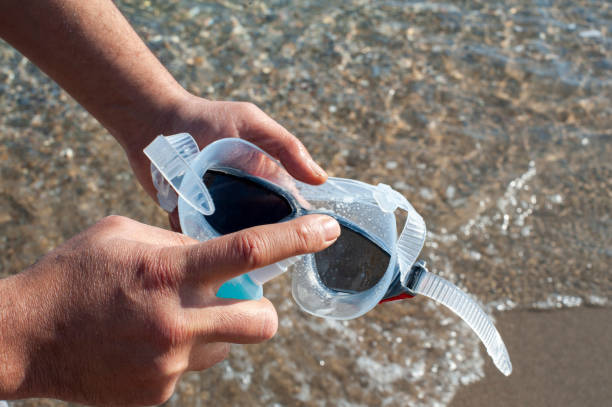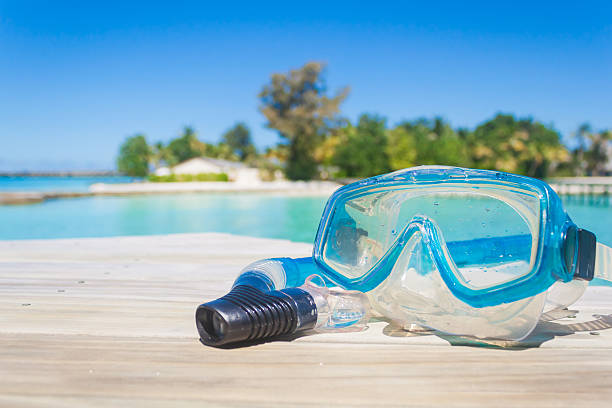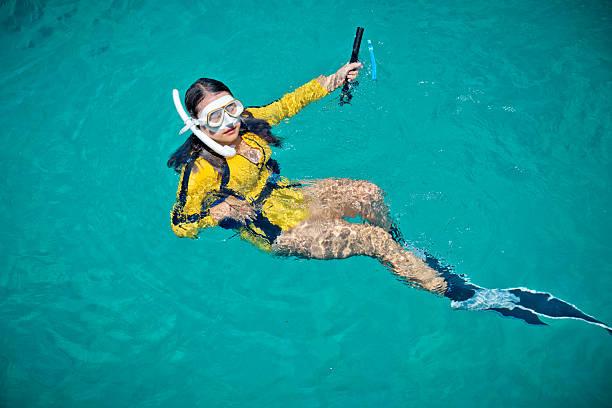Diving reveals a world full of color, life, and wonder beneath the surface. Free diving and scuba diving offer unique ways to explore it, each with different skills, gear, and experiences. Whether you are a diver, enthusiast, or swimming gear professional, understanding these differences helps you choose the right approach and make the most of every underwater adventure.
Quick Definitions
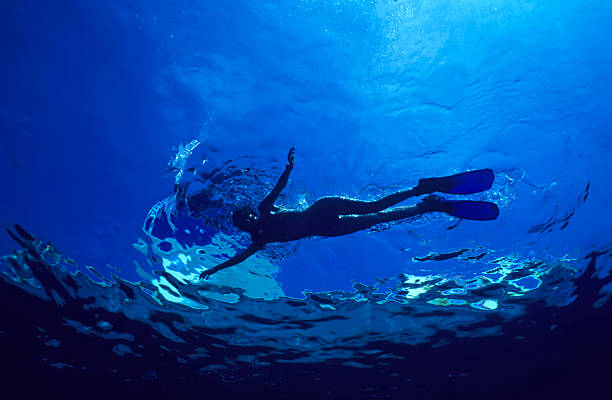
What Is Free Diving?
Free diving is a type of underwater diving that relies entirely on holding your breath. Divers do not use tanks or regulators. Instead, they train their lungs and bodies to tolerate longer periods without oxygen. Depths vary; recreational divers usually stay under 20 meters, while competitive free divers can exceed 100 meters. The experience is quiet and meditative, with minimal gear like a silicone mask, snorkel, fins, and sometimes a wetsuit.
What Is Scuba Diving?
Scuba diving uses a self-contained underwater breathing apparatus (SCUBA) to allow a longer time underwater. Standard gear includes a compressed air tank, regulator, buoyancy control device (BCD), fins, and a mask. Recreational dives generally reach up to 40 meters, while technical diving can go much deeper. Scuba diving emphasizes comfort and extended exploration rather than breath-holding skill.
Side-by-Side Differences
To really grasp the difference between free diving and scuba diving, it helps to see them side by side. Here’s a quick overview of how they compare:
Característica | Free Diving | Submarinismo |
|---|---|---|
Respiración | Single breath | Air tank and regulator |
Dive Duration | Short, limited by lung capacity | Longer, depending on the air supply |
Gear | Minimal – mask, aletas de snorkel, wetsuit | Full setup–tank, regulator, BCD, gauges |
Depth | Moderate, depends on skill | Can reach much deeper safely |
Experiencia | Silent, intimate, connected to water | Relaxed, leisurely, great for observing and photography |
Learning Curve | Focus on breath control and technique | Focus on gear handling and safety procedures |
This table makes it easy to see why free diving feels like dancing with the ocean, while scuba diving offers more time and freedom to explore.
Key Differences Between Free Diving and Scuba Diving
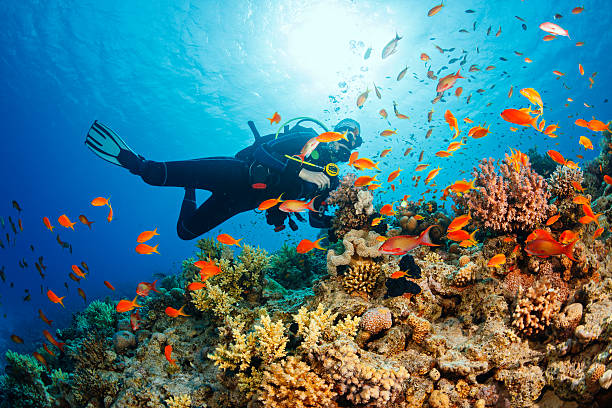
Equipment and Setup
Free diving relies on minimal, lightweight gear to reduce drag and allow maximum freedom of movement. Typical equipment includes:
- Silicone mask (often low-volume for easier equalization)
- Esnórquel
- Long, flexible fins
- Thin wetsuit for thermal protection
- Optional weights for neutral buoyancy
In contrast, scuba diving requires more complex gear to support longer underwater duration:
- Compressed air tank and regulator
- Buoyancy Control Device (BCD)
- Fins (shorter for maneuverability)
- Larger mask for a wider field of view
- Dive computer and gauges to monitor depth and air supply
The difference in gear directly reflects each diving style’s purpose: free diving emphasizes efficiency and mobility, while scuba prioritizes comfort, safety, and extended time underwater.
Duration and Depth
Free diving duration is limited by breath-hold capacity. Recreational free divers typically stay under 20 meters for 1–3 minutes, while trained athletes can reach 40–100 meters or hold their breath for 4–10 minutes. Depth and time are closely linked, requiring strict control over breathing, relaxation, and descent technique.
Scuba diving allows much longer underwater stays. With standard tanks, divers can remain submerged for 45–60 minutes at recreational depths (up to 40 meters). Technical divers using specialized gas mixes may reach depths beyond 100 meters. This extended time enables slow, detailed observation of marine life and underwater environments.
Physical and Mental Demands
Free diving places high demands on both body and mind. Divers must manage:
- Lung expansion and oxygen consumption
- Heart rate and relaxation techniques
- Equalization of pressure
Mistakes can be dangerous, with blackouts as the primary risk. Mental focus is essential to control stress and maintain safety.
Scuba diving reduces physical strain related to breathing but introduces equipment management responsibilities. Divers monitor air supply, buoyancy, and depth while staying alert to environmental changes. Both different diving types require strong swimming skills, but scuba offers a more controlled, less physically taxing experience.
Cost and Accessibility
Free diving is generally more affordable. A basic setup costs $200–$500, and certification programs are shorter and less expensive. Minimal gear also makes travel and transport easier.
Scuba diving involves higher upfront and ongoing costs. Beginner kits often exceed $1,000, and certification courses cost $400–$600. Dive travel and equipment maintenance add to expenses. For manufacturers and retailers, these differences highlight market opportunities for both budget-conscious beginners and professional divers seeking advanced gear.
Environmental Interaction
Free divers often enjoy a quieter, more immersive underwater experience with minimal disturbance to marine life. The short duration limits detailed observation, but the connection to water and movement feels natural.
Scuba divers can spend longer underwater, making it easier to study, photograph, or guide others without rushing. Larger equipment slightly increases presence in the environment, but the extended time allows for thorough exploration and detailed enjoyment of marine ecosystems.
Choosing What Fits You
Assess Your Goals
Choosing between free diving and scuba diving starts with understanding your personal goals. Ask yourself:
- Do you seek the thrill of pushing your body to its limits? Free diving may suit you.
- Are you more interested in extended exploration, underwater photography, or observing marine life? Scuba diving is likely a better fit.
Many divers start with scuba to learn safety and basic skills, then explore free diving as a complementary activity. Knowing your goals helps determine training requirements, gear preferences, and diving style.
Consider Physical Condition
Physical readiness is essential for safe and enjoyable diving.
Buceo libre requires:
- Strong lung capacity and cardiovascular fitness
- Efficient swimming technique
- Mental focus and relaxation skills
Beginners often need months of breath-hold and relaxation training to dive comfortably. Experienced free divers maintain regular workouts and specific exercises to improve oxygen efficiency.
Submarinismo is less physically demanding in terms of breathing, but still requires:
- General fitness and stamina
- Swimming skills for maneuvering with equipment
- Ability to manage gear underwater
Both types benefit from consistent practice and conditioning, but free diving emphasizes endurance, while scuba emphasizes control and safety.
Factor in Safety and Training
Safety is a critical consideration for all divers.
Free diving training focuses on:
- Breath-hold techniques
- Equalization methods
- Blackout prevention
- Buddy diving practices
Scuba training emphasizes:
- Equipment handling and emergency procedures
- Buoyancy control and depth limits
- Decompression rules and dive planning
Certification courses provide structured learning and practical experience for both diving styles, but the risks and safety protocols differ. Awareness of these differences ensures a safer, more confident dive.
Evaluate Equipment Preferences
Equipment preference can influence the diving style you choose.
Free diving gear is minimal and lightweight:
- Low-volume masks for easier equalization
- Long, flexible fins for efficient propulsion
- Thin trajes de neopreno for comfort and thermal protection
Scuba diving gear is more complex:
- Air tanks and regulators
- Buoyancy Control Devices (BCDs)
- Shorter fins for maneuverability
- Dive computers for monitoring depth and time
Understanding gear requirements helps divers choose the right equipment and allows manufacturers to design products tailored to different needs.
Reflexiones finales
Whether you’re drawn to the quiet thrill of free diving or the relaxed exploration of scuba diving, the underwater world has something for everyone. Equip yourself with the right gear, train smart, and dive safely.
Ready to dive in? Explore high-quality gear, expert tips, and everything you need to start your underwater adventure with Vanguardia today. Your next unforgettable dive is just a splash away!
Preguntas frecuentes
1. Is freediving harder than scuba diving?
Freediving can be more challenging because you rely solely on holding your breath, while scuba provides a continuous air supply.
2. Can free divers go deeper than scuba divers?
Generally, scuba divers can go deeper safely due to tanks, but experienced free divers can reach impressive depths using advanced techniques.
3. Why can’t you freedive after scuba diving?
After scuba diving, your body retains extra nitrogen, which increases the risk of decompression sickness if you freedive immediately.
4. Do free divers hold their breath?
Yes, holding your breath is the core of freediving, allowing you to explore underwater without tanks.
5. How to choose the best free diving mask?
Look for a low-volume mask that fits snugly, provides a wide field of view, and allows easy equalization for comfortable and safe dives.
